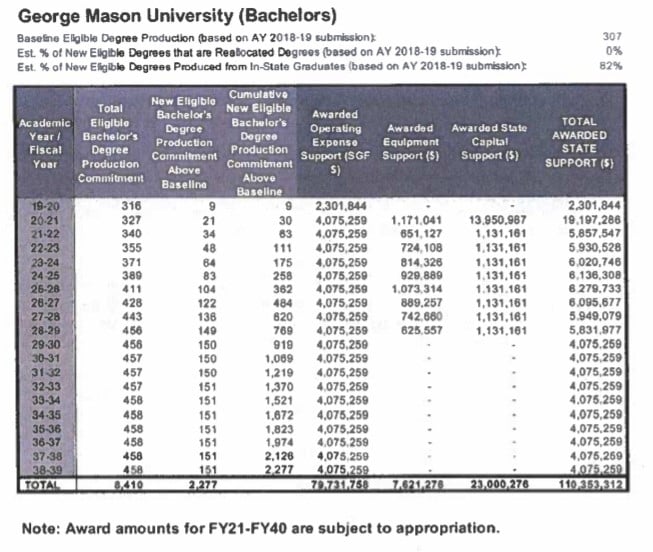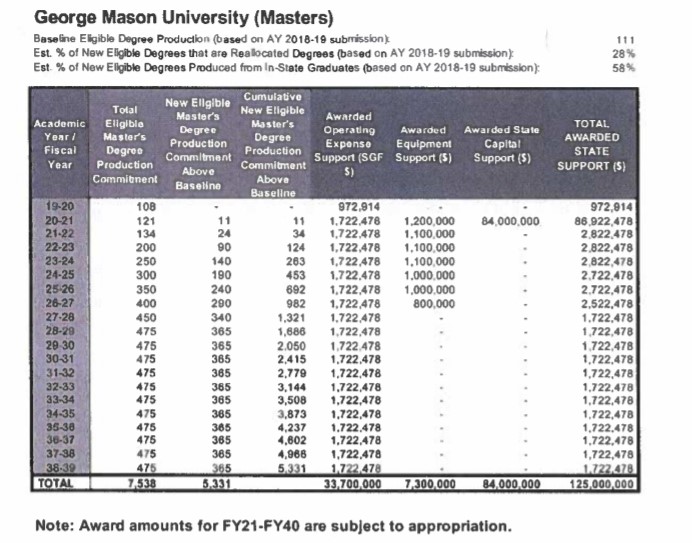You have /5 articles left.
Sign up for a free account or log in.

Istockphoto.com/izusek
The commonwealth of Virginia will produce an additional 31,000 technology graduates over the next 20 years, Governor Ralph Northam announced yesterday.
That goal is an expansion of the state’s originally stated legislative target of graduating 25,000 additional students with technology degrees by 2039. Virginia's public universities currently award approximately 1,300 bachelor’s degrees and 400 master’s degrees in computer science per year, according to the governor’s office.
The push to boost the tech talent pipeline was driven by the imminent arrival of Amazon in Virginia. The Seattle-based company is building a second headquarters in Arlington County, Va., and is expected to create thousands of jobs in the region for skilled workers, particularly those with cloud computing expertise.
To boost the number of computer science graduates produced by the state, 11 universities are expected to share a total of $961.5 million in state funding over the next two decades for the expansion of their degree programs and construction of new facilities. The funding will be awarded on an annual basis and is subject to the universities meeting certain enrollment and fundraising targets set by the state. The agreements can be accessed here.
“This initiative is an investment in Virginians,” Northam said in a news release. “Virginia’s tech sector will continue booming only if we can train the workforce that those jobs require. With today’s announcement, we are educating a workforce that will fill jobs at hundreds of tech companies around the Commonwealth, including at Amazon.”
Northam approved $16.6 million for the Tech Talent Investment Program in the state budget earlier this year, however, the allocations to individual universities had not previously been announced. New details of this first round of funding allocations show Virginia Tech and George Mason University will receive the lion’s share of the funding. This reflects the fact that they are projected to enroll the most additional students.
|
Universities Participating in Tech Talent Investment Program (TTIP) |
Total Additional Bachelor's Degrees by 2039 |
Total Additional Master's Degrees by 2039 |
TTIP Funding Allocated in Fiscal Year 2020* |
Total Anticipated State Support to 2039 |
|
Virginia Tech |
5,911 |
10,324 |
$5,476,345 for B.S.; $1,842,378 for M.S. |
$295,000,000 for B.S.; $250,000,000 for M.S. |
|
George Mason University |
2,277 |
5,328 |
$2,301,844 for B.S.; $972,914 for M.S. |
$110,400,000 for B.S.; $125,000,000 for M.S. |
|
.University of Virginia |
3,416 |
0 |
$463,889 for B.S. |
$33,100,000 for B.S. |
|
College of William & Mary |
930 |
0 |
$781,842 for B.S. |
$28,900,000 for B.S. |
|
Old Dominion University |
765 |
0 |
$836,472 for B.S. |
$29,200,000 for B.S. |
|
Virginia Commonwealth University |
722 |
0 |
$759,772 for B.S. |
$30,500,000 for B.S. |
|
James Madison University |
467 |
0 |
$387,126 for B.S. |
$14,300,000 for B.S. |
|
Radford University |
394 |
0 |
$501,080 for B.S. |
$17,400,000 for B.S. |
|
Christopher Newport University |
392 |
0 |
$424,587 for B.S. |
$15,000,000 for B.S. |
|
Virginia State University |
186 |
0 |
$172,740 for B.S. |
$7,300,000 for B.S. |
|
Norfolk State University |
126 |
0 |
$136,464 for B.S. |
$5,300,000 for B.S. |
|
*$1,542,547 of the $16,600,00 TTIP funding for 2019 has not been allocated and is marked as "TBD." |
||||
Both Virginia Tech and George Mason pledged to significantly expand their tech degree programs and to build new facilities in response to Amazon’s HQ2 announcement in 2018. Inside Higher Ed reported earlier this year that George Mason’s ambitious target of more than doubling the size of its computer science degree programs by 2024 seemed unlikely given the relatively small amount of funding the university had so far secured from the state.
George Mason was awarded $7.5 million in the 2019 state budget to knock down an old building on the university’s campus in Arlington and make room for the construction of a new 400,000 square-foot Institute for Digital InnovAtion (IDIA). Virginia Tech, by contrast, was allocated $168 million to put toward the university's planned Innovation Campus. The funding disparity prompted questions about Virginia Tech potentially receiving preferential treatment, which state representatives denied.
In this first round of Tech Talent Investment Program funding, George Mason has been allocated $2,301,844 to support the expansion of its bachelor’s degree programs and $972,914 to build up master’s degree programs. Over the next 20 years, the university anticipates receiving a total of $110 million to support its bachelor's degree programs and $125 million for master’s degree programs. Future funding will be subject to George Mason meeting the enrollment targets outlined in the tables below.

 Both George Mason and Virginia Tech will be busy raising funds in the coming years, because state support for the expansion of their master’s degree programs is contingent on the universities matching the state funding. George Mason representatives reported in August that the university had already raised approximately $20 million.
Both George Mason and Virginia Tech will be busy raising funds in the coming years, because state support for the expansion of their master’s degree programs is contingent on the universities matching the state funding. George Mason representatives reported in August that the university had already raised approximately $20 million.
Michael Sandler, interim vice president of communications at George Mason, said in an email that leaders of the university were pleased with the allocations. The university’s agreement with the state outlines a target of gradually growing enrollment in the university's computer science programs over the next 20 years.
Sandler said George Mason is still on track to grow its computer science enrollment to 15,000 students by 2024 if other technology-related degrees are included, such as computer game design or cybersecurity. Sandler said the university is anticipating significant enrollment gains in the coming years.
Anne Holton, interim president of George Mason, said in a news release that the state’s investment “confirms our standing as a significant producer of diverse tech talent in Virginia.”
“We’re grateful to state officials for their confidence in our ability to continue to deliver talent for decades to come,” she said.








